INTERVIEW: FIRE&DUST MEETS JOE COOK
Joe Cook is a musician, lyricist, music producer and spoken word artist from Birmingham (UK). Joe plays drums and percussion in various musical projects, performing live at venues and festivals across the UK and Europe. Through a love of lyricism, hip-hop and song-writing, Joe crash landed in the spoken word / poetry scene. His work has been shared on various BBC platforms such as BBC Arts, BBC 1XTRA, BBC Asian Network as well as performing on BBC Doctors. Joe is passionate about music and art to be used as a tool for social change and has worked alongside various charities and activist groups internationally to fundraise, raise awareness and campaign for social justice. He facilitates music and lyric-writing workshops in schools, community centres and extended learning centres across the Midlands. Most recently, Joe was an artist in resident for Coventry City of Culture 2021’s CVX Festival and has had his work published by Little Tiger Books as part of their Courage in a Poem collection. Joe is strongly passionate about young people expressing themselves and being able to channel their thoughts, frustrations and passions through music and lyrical content.
Joe was our first headliner of 2023 at our Fire & Dust poetry night on 5th January. His entertaining set was well-received by the audience and we caught up with him after the event, to ask a few questions…
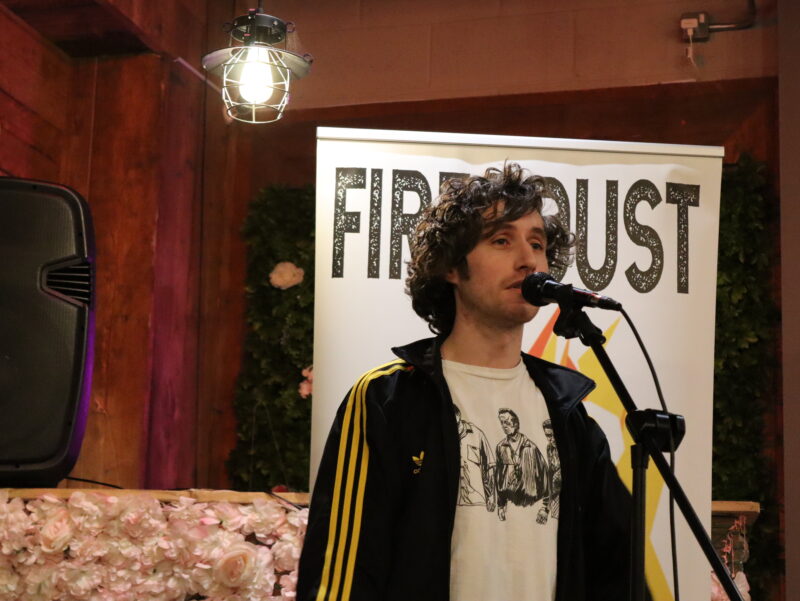
Photography credit: Tracy Morris
HCE: Tell us a little about your background and journey as a writer so far. What inspired you to start creating and performing poetry?
JC: My background is within music. I play drums and percussion and consider myself a drummer before anything else. When I started my band Lobster back in 2009, we needed some songs so I had a go at writing lyrics. I’d always had an appreciation of and interest in lyrics. Growing up listening to a lot of hip-hop and rap from the UK and USA as well as a love for folk music (mainly Irish stuff), which I always thought had great lyrics, images, storytelling, etc., I started writing more for the hell of it rather than just focusing on songs. Initially, I started rapping making really basic beats and loops and rapping over them. A friend of mine I met at University was big into hip-hop and grime and really switched on with those kind of lyrical genres; he showed me a video of George The Poet and I just thought ‘I’ve got books full of rhymes, I could do this’.
In terms of inspiration, the more I think about it, there’s loads of different moments and interests in my life that led me on this poetic path. A love of lyricism is the main factor but my parents are big fans of stand-up comedy (both my folks could honestly be comedians), so I always had an appreciation for that art form and the use of words to entertain and make people think. I used to like writing short stories when I was a kid and one of my cousins used to write stories for me in the form of a poem about a character called ‘Red Joe’. I’m interested in opposites and trying to step out of my comfort zone as much as possible, so for me being a drummer/songwriter in a band to then being just one person, not hidden behind a drum kit and performing with no music, seemed like a cool challenge. For me, spoken word is about seeing if your lyrics can hold up without any music or distractions. I always found it fascinating that stand-ups, poets, acapella singers (another nod to folk music) could get up and rock a crowd with just their voice and their words – that really interested me.
I’m rambling on now but the big light bulb moment for me was there was a documentary called ‘Life of Rhyme’ on Channel 4 which was presented by Akala looking at UK rap and grime. In it there was section of MCs performing acapella and I just thought it was so sick! I loved the way it was still engaging and rhythmic with no beat.
HCE: Who is your work aimed at – do you have an ideal audience in mind when you’re putting a poem or track together?
JC: I don’t think anyone has ever asked me this before, so great question. I’m really not sure of my audience. A lot of my stuff isn’t really child-friendly even though I write a lot about the education system, which most likely resonates more with younger people. I often write from a social-commentary standpoint, often from some form of anger and being critical of a situation. With this kind of material – if you want to call it ‘Political’/‘Protest’/‘Conscious’ – I guess there’s always that element of preaching to the converted, but honestly I love it when people disagree with me. I’ve been in a few situations where I’ve performed (mainly to do with the education system) where I’ve been very critical of systems, professions, structures, where I’m essentially addressing people in the room. It’s sometimes a nice feeling to feel like you are rattling a cage. At its core, I write for me. I write about stuff I want to talk about, I want to hear, I find interesting or I’m connected to, and if people want to listen and like what they hear that’s fine. If they don’t like what they hear, that’s also fine. The only thing that’s constant when I think about the audience is that I want them to laugh, or find it funny; even if it’s one line in a piece, that’s something I always try to achieve.
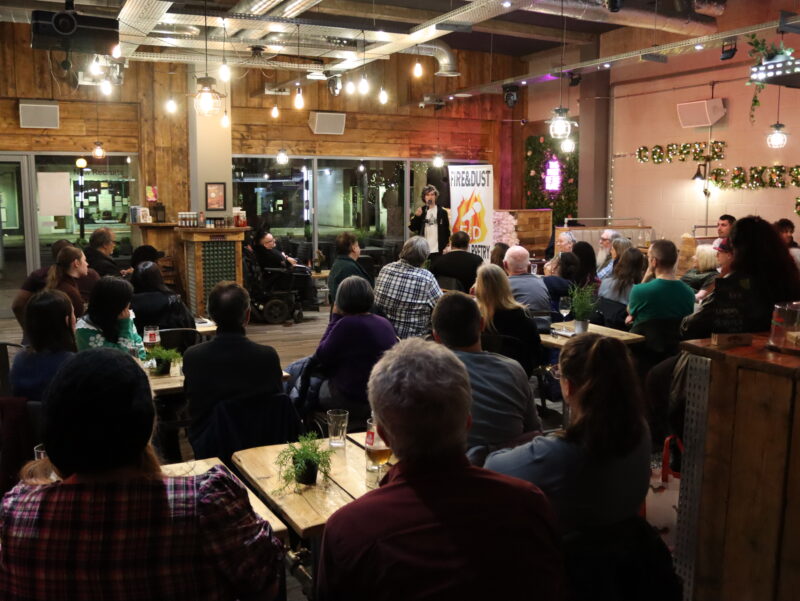
Photography credit: Tracy Morris
HCE: Your Fire&Dust set showed that you’re an experienced and compelling performer. Have you always been confident in front of a crowd or is it something you had to work on?
JC: Nice one! I’m always proper nervous every time I perform. I always say to people I go into ‘auto pilot’ and just start chatting away down the mic, it’s 100% nervous energy but I’m glad people see it as compelling. I did drama for years up until I was 18 so I learnt about being on stage, feeling your heart racing in your chest but just carrying on with the show and performing. I think nerves are good. It shows you care about what you are doing. I’m still trying to get better at my performance. I often have things I want to say in-between my pieces, like an act or a routine if you will, but I always forget them because of nerves. I’m not a very confident person and I often don’t think people are going to enjoy or ‘get’ what I’m going to do (I don’t know why, it’s just what I think in my head) so it’s always a real buzz for me, like a proper adrenaline dump when things go well on stage because I’m never really expecting it. Again, from being a drummer, I still get nervous now and then playing in bands but I’m at the back often hidden behind the lead singer’s arse and tucked behind a drum kit, so it’s not as exposing.
HCE: Would you say there are themes or motifs that you gravitate to in your work?
JC: When I first started writing it was all about ranting, being political, social commentary and, I’ll be honest, it still is mainly that but I’ve noticed I’ve also started to be a bit more introspective in my writing, which I enjoy. Again, going back to my influences in music, stand-up, the tunes I listen to and am inspired by – punk, reggae, hip-hop, folk, comedy – are often very social commentary orientated or historical. I’ve got other themes I want to delve into, I’m just trying to find interesting ways of going about it so it’s not so ‘literal’? For example, I’ve been writing something for years about my Grandad’s life and I’ve also wanted to write about some more traumatic stuff that’s happened in my family but am still wrestling with how to go about it, and how to make it both for me and interesting. I think as an artist it’s good to have a variety of topics in your set. My uncle who’s a musician calls it ‘shade’ within music: you want a slower ballad, a fast tempo dance number, a mellow tune… I try and apply that to my writing. No one wants a 20-minute set just moaning about the Tories. There are themes I could always write about as they are big parts of my life, such as learning difficulties, Malta and youth issues, etc.
HCE: Can you offer any tips or advice for aspiring spoken word artists? What do you think are the most important elements for creating an effective piece of spoken word?
JC: Really try and tap into your true self. I know that’s some proper Zen, philosophical way of putting it but I’ve always said from when I first started doing this that you hear similar styles, cadences, rhythmic patterns, deliveries. It’s going to happen as you take inspiration from people – but try and break that pattern as much as you can. When you’ve completed something and start a new piece, think ‘what can I do differently with this one?’ It could be something that only you would realise, like ‘I’m going to start this one with the title’ or a more writing technique orientated element: ‘I’m going to use alliteration in this one’ or ‘I’m going to use some repetition’. So look back and try and bring something different to the next piece (‘the last one didn’t have any smilies. I’m going to try and add some similes in this’). For me, that keeps writing for yourself interesting and for your performance as you’ve got different feels, rhythms, structures in your material. If the audience can work out your vibe and it’s that same vibe for 20 minutes, I think people start to switch off.
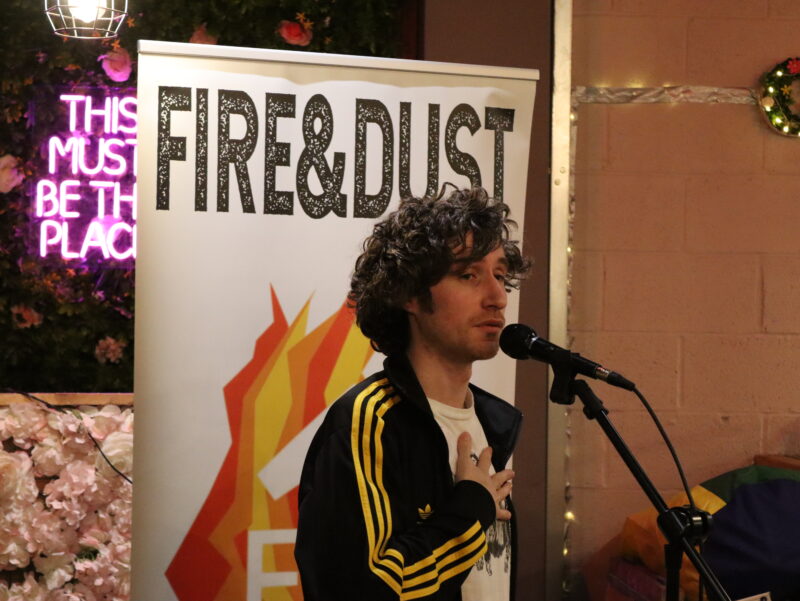
Photography credit: Tracy Morris
HCE: During the gig, you made a passing reference to George Orwell’s ‘Inside the Whale’ essay and the concept of writing for yourself. Can you tell us some more about this and how it impacts on your work?
JC: This is a bloody great set of questions. So, just for context, my mate Vafa who is a great writer and film-maker told me about that at a certain time in my life where things weren’t really going the way I wanted them and I felt like I was in a bit of a rut as someone who often writes more social commentary; although it’s my opinion I’m using the world around me, the news, articles, research to build the rhymes. But with ‘Inside the Whale’ (or belly of the whale as I always call it), you have to dig a bit deeper into yourself, beyond your opinions; I guess it‘s about being vulnerable. I think writing something for yourself because you need to is really important. I’m not a therapist but it’s clear that’s going to have some therapeutic value (if facilitated and done correctly). A huge amount of my work with young people often labelled ‘at risk’ is getting them to write lyrics on a more personal level rather than fantasy or promoting violence, materialism, disrespecting the opposite sex – and I see a real value in that. When it can become a coping mechanism and something which can support your mental health, that’s a massive deal.
What I’ve enjoyed about it is I’ve often written about things very specific to myself, which I doubt is going to connect with people but there’s always someone that gets it and relates to it. For example, I’ve got an old piece about my Maltese heritage. I can say I’ve performed it about twice in front of anyone who has Maltese heritage (and most of them I was related to). But I’ve had people come up to me who really enjoyed it and said they ‘get where I’m coming from’; for example, I had a guy talking to me who was from Iran and it resonated with him. That Maltese poem actually made someone (who wasn’t Maltese) cry once at a gig in London. So yeah: just, real recognises real.
HCE: How does it feel to be getting positive recognition from platforms like BBC Radio?
JC: It’s really great. It’s nice to be on platforms where they might not really be pushing spoken word and it’s getting a good reception. It’s always surreal to me and I try not to get too hung up or dwell on it. I often forget some of the radio stuff I’ve done because it’s just that artistic grind of going on to the next thing. But it feels like a bit of a badge of honour, which is nice, but I don’t let it go to my head.
HCE: In your experience, is Birmingham a good place to be a spoken word artist, and does the city have a thriving creative scene?
JC: I’m a very proud Brummie and I’ve been involved in the Birmingham creative scene for over a decade. I think Birmingham had a really healthy Spoken Word scene for years and I think it’s limped a bit, it almost had a ‘golden age’ feel – but that might be just being a grumpy older git and being like ‘it was better back in my day’. That being said, certain nights have stopped, etc., so the landscape has changed. My issue was that sometimes there was almost too much going on. You could perform every night of the week if you wanted to and I think it creates a bit of a bubble, an echo chamber, because you‘re not going to reach bigger audiences, etc. The city has changed a lot recently; areas like Digbeth, that for me were my stomping ground and a big hub for creativity, have been gentrified for a better word or been turned into a club strip you would see on a lads’ holiday. For example: the studio we used to practice and record at, which was a hub for loads of great Birmingham bands and D.I.Y shows, labels, etc. is now an adult ball pool. You couldn’t make it up! You can still put on shows, go to gigs round there, but it’s a different night life and crowd now. The best stuff for me in the city you have to really find, proper hidden gems.
HCE: Who are some of your favourite poets and lyricists? What sort of influence have they had on your own writing, if any?
JC: Lyricists that I’ve been influenced by for a while are people like Akala, Public Enemy, Wu-Tang Clan, Immortal Technique, Brother Ali, Blackthought Yasiin Bey. Shane MacGowan is my favourite songwriter. I also grew up listening to a lot of The Dubliners, so Luke Kelly’s songs.
Poetry-wise, it’s really bad to say but I don’t really listen to a lot of poetry and I even rarely read it! Obvious ones for me are Benjamin Zephaniah and Linton Kwesi Johnson, but strictly speaking most poets I’m inspired by are people I’ve seen or me mates so people like Casey Bailey, Tremendous, Amerah Saleh, Leon Poetry, Jasmine Gardosi, Jamie Thrasivoulou, Willis The Poet, Lexia Thompson, Nafeesa Hamid, etc. Comedians like Bill Hicks, Richard Pryor, George Carlin, Stewart Lee, Sarah Silverman, Bill Burr, Michael Che are a big influence on me also. In terms of influence, for me it’s about being ‘lyrical’ – so, not having obvious rhymes and punchlines and being humorous. If it’s topical, thought-provoking and funny that’s the winner for me.
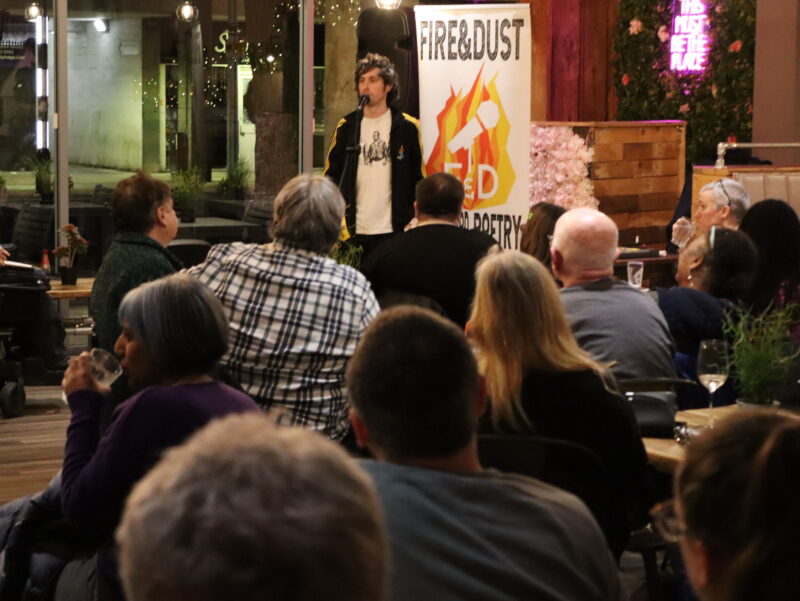
Photography credit: Tracy Morris
HCE: Would you say poets tend to place too much value on being published as their end goal? For you, is publication important, or do you focus more on other elements like growing your reputation as a performer?
JC: I swear I’m dancing around all these questions. I think a lot of it is about what your background is and how you found poetry/spoken word, etc. For me, coming from music, publishing wasn’t a thing I was aiming for, as it’s not a thing in my musical world. It was more about putting stuff out, recording, making videos, etc. However, I’ve been doing this a little while now and I’m trying to focus more on how people can access my work, whether that’s through listening to a recording, watching videos or a publication. Sometimes I have a good gig and people come up to me and ask where they can buy a book or pamphlet and I’m like ‘Oh, I don’t have any’. Again, I think because for me this is hip-hop, rap, etc. it’s not a serious page poetry literature thing. It’s about listening and experiencing it, I don’t write for the page in mind.
Like most things, there’s a huge D.I.Y. element with publication now where you can print, distribute and market your material in a physical form. I don’t think being published is a particular mark of success or talent, to be honest. I’m often in a performance situation where I’m the only spoken word artist on the bill and I love that challenge of winning over a crowd, performing in-between bands or other musical acts – that’s something I’m always working on. I’m not just here to read from a book, I’m here to perform, entertain and hopefully hold a crowd’s attention. It’s all down to personal preference really. There are brilliant writers who have never stood up to the mic, etc. All that being said, I’ve recently been published in a children’s poetry book called ‘Courage in a Poem’ with some amazing artists, which is a great feeling. BUT the publishers reached out to me after they had seen one of my videos online, so I think having your material available in different formats on different platforms is an important focus for artists. Also (I know it links nicely onto the next question) – I’m severely dyslexic, I struggle to read. I have Irlen syndrome so words move on the page for me. A lot of deep, big fancy words go over my head, especially written, so the page hasn’t always been the end goal for me.
HCE: Some of your poems touched on personal experience of having learning difficulties like dyslexia, dyscalculia and dyspraxia. In your opinion, what more should arts communities be doing to support neurodivergent writers and performers, to make sure their voices are platformed and heard?
JC: Again, these are great questions. For me spoken word and poetry is very inclusive and I think Fire & Dust is a brilliant example of that. Unfortunately, I think there’s a lot of ignorance around learning difficulties, especially when it might affect people‘s behaviour in public spaces, etc. and in any art form there’s always snobbery – especially in spoken word scenes, where I find a lot of people have studied in higher education in subjects like Creative Writing and English Literature and have read hundreds of famous, old, mainly dead poets‘ work. Which is somehow seen as a form of intelligence or high art/low art kind of thing. I’m not sure where I’m going with this to be honest, ha.
If we are starting from the ground up, I think it‘s important for artists who have those difficulties to work with people, any age range, who also have those same struggles and experience that in workshop settings. That kind of ‘If I can do it, you can do it’…hell, you might be able to do it even better than me! The amount of times I’ve heard ‘I can’t write, I’m dyslexic’, it’s mad. I guess they are hidden/invisible disabilities for a reason. You don’t want to go into the realm of tokenism of having people with learning difficulties perform just because they have learning difficulties to make you look good as a promoter. I think it’s more down to the artists themselves; if you feel you want to talk about your learning difficulties, get up there and do it. Don’t wait for a platform to come along, make your platform.
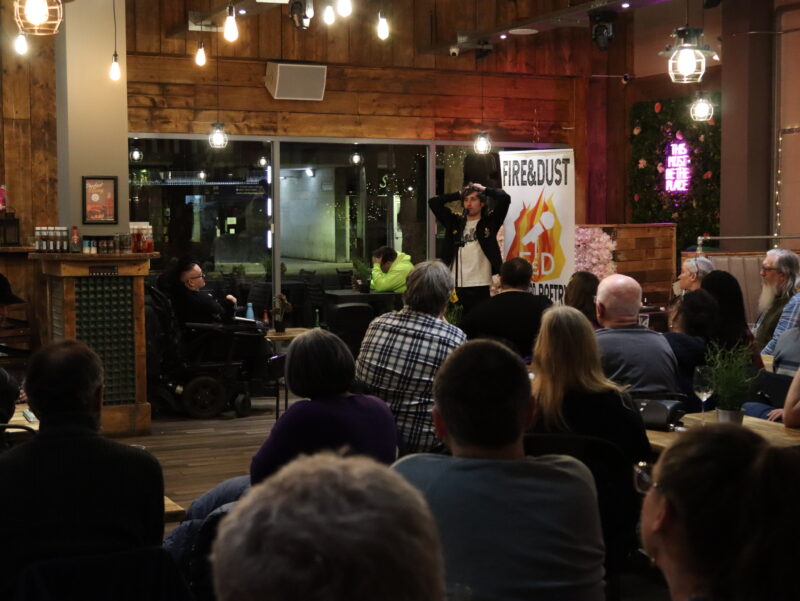
Photography credit: Tracy Morris
HCE: What’s next on the horizon for you?
JC: I’ve been working for sometime on a EP, which might end up being an album. It’s a mixture of spoken word, music and rap. I’ve got about 7 tracks recorded and at this very moment in writing I’m planning on recording another one tonight! I’m just working on some new ideas really that have been kicking around my brain for a while. I don’t like performing stuff reading from a page, so I’m trying to learn them off by heart and get them to performance-ready. Music-wise, I’ve got a load of instrumental music I’ve been working on for years, which I need to release, and my band Lobster have an album ‘Year of the Lobster’, which is ready to release – just tying up the loose ends and getting some vinyl printed! I’ve got six tracks ready to release I’ve made with young people in ELCs in Coventry to release through the City of Culture legacy. So, yeah…I’ve got a lot to get out there.
HCE: What’s the best way for people to keep connected with you and your work, or contact you about bookings?
Twitter Instagram YouTube Facebook
HCE: Is there anything we didn’t cover that you’d like to share with our readers?
JC: This was a great set of questions and a great gig, so a massive thank you to you and the team.

Photography credit: Tracy Morris
Joe worked with young people from Extended Learning Centres (formerly Pupil Referral Units) across Coventry to create an album called Barriers to Bridges. Visit this website to view the videos produced for it.
